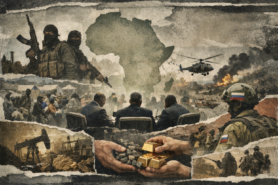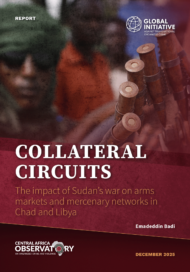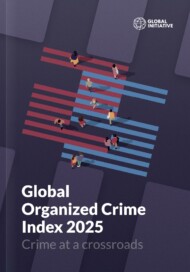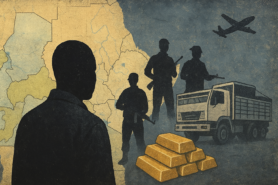In January 2025, a 177-carat rough diamond, one of the largest ever found in the Central African Republic (CAR), disappeared without a trace. Sources familiar with the case told the Global Initiative Against Transnational Organized Crime (GI-TOC) that a US$5 million deal with a licensed South African diamond trader was abruptly cancelled in February, after the CAR-based leader of Russia’s private military company the Wagner Group intervened. The gem’s current whereabouts is unknown, but sources have confirmed that there is no record of it having been legally exported.
Authorities had unveiled the stone just weeks after the country’s decades-long ban on rough-diamond exports was lifted, and it was hailed as a sparkling symbol of economic recovery. This promise soon gave way, however, to familiar patterns of opacity, predation and capture.
The incident reflects a broader trend. In the CAR, the mining sector is in the grip of exploitative networks that thrive on the very violence they perpetuate. Historically dominated by actors with ties to China and Lebanon, as well as neighbouring countries such as Cameroon, Chad and Sudan, the sector is now witnessing the emergence of foreign security allies, including Wagner and Rwanda. Their methods differ greatly: Wagner relies on terror and predation to achieve its economic objectives, whereas Rwanda pursues active economic diplomacy, combining formal investments with shadow networks.
Since late 2020, Wagner and Rwandan forces have become key players in the CAR. By rescuing the government from a rebel coalition, they positioned themselves as the true arbiters of security and economic matters. However, their protection has come at a high cost: control over the country’s strategic resources. What began as military assistance has evolved into the systematic capture of mineral wealth to serve transnational private interests, a process reinforced by the complicity of local elites.
In 2021, Wagner launched a violent operation targeting armed rebel groups threatening to destabilize the regime. While this campaign dealt a heavy blow to the militias, it simultaneously bolstered the influence of criminal networks linked to political elites, giving them a firmer hold over the broader economy, particularly the extractives sector. For Wagner, controlling Central African mines has become the economic cornerstone of its presence and operations.
Research by the GI-TOC found that the US-sanctioned entity does not merely secure sites – it seizes them. Its approach has been consistent: by eliminating competitors, intimidating officials and obtaining permits under opaque conditions, it has laundered gold and diamonds through shell companies. The examples abound. For example, Ndassima, an industrialized gold mining site, has been under Wagner’s control since 2020. Mercenaries have blocked official inspections and threatened state agents attempting to enter. ‘Wagner repeatedly threatened an official who tried to oversee their activities,’ said a source familiar with the issue. Later, in 2023, Wagner took control of the Yidéré-Baboua area, known for its artisanal gold mines, through a military operation allegedly marked by atrocities against surrounding communities.
Interviews undertaken by the GI-TOC revealed that, although Wagner began paying some negligible taxes to the CAR to maintain a presence at the mines, production and profits are not monitored or regulated. Ndassima has been fully operational since late 2022 and reportedly generates around US$100 million annually. However, official documents show that no output is declared and no exports are recorded. Three separate sources indicated to the authors that some of the gold is sold locally to fund Wagner’s operations, but most of it is smuggled abroad, including on covert flights through Somalia to Dubai.
Wagner’s operations combine violent depredation with a sophisticated, transnational logistics network. These activities drive the group’s military and political influence. The profits are so lucrative that the group persists despite the Russian authorities’ attempts to replace it with the paramilitary group Africa Corps, and it is supported by the CAR’s ruling powers, who depend on its continued presence.
Rwanda’s involvement in the CAR, meanwhile, has ramped up since 2019, driven by bilateral agreements and close military cooperation. Alongside this expansion, companies and investors linked to Kigali have gained a foothold in the mining sector through various partnerships and ventures. These operations are reportedly conducted under the protection of the Rwandan military.
According to several sources, alongside these formal investments, large-scale gold smuggling is facilitated by informal Rwandan-linked networks. Shell companies with no operational presence purchase and export untraceable gold, allegedly with the help of complicit airport personnel in Bangui. Other channels involve buyers who claim to have ties to Rwandan refineries and who pre-finance the purchase of gold from territories controlled by armed groups. These practices reveal a sprawling parallel economy that is underpinned by high-level protection.
The involvement of political and security elites in the CAR compounds the problem. Mining permits have reportedly been granted under irregular conditions. Constitutional reforms reducing parliamentary oversight of mining contracts have amplified the risks, turning the sector into a political bargaining chip and resulting in deals being handed out as rewards to security allies.
But at the heart of these dynamics lies a human tragedy. Civilians bear the heaviest burden of violence at mining sites, experiencing abuse, forced displacement and thus the obliteration of their livelihoods. ‘The way the Russians treat us is inhumane. They kill people and decapitate the bodies,’ one man, who was expelled from the Yidéré mining site by Wagner men, told the authors.
Threats, corruption and fear weaken institutions, causing state sovereignty to erode and driving away legitimate investors. This gives way to a criminalized economy with regional and global ramifications, and perpetuates the protracted conflict that has plagued the country for years.
Yet, with immediate and decisive action, this trajectory can be changed. While acknowledging the full scope of the problem, it is urgent to adopt targeted measures against the national, regional and international actors orchestrating these operations behind the scenes. At the same time, the CAR must establish a robust regulatory and incentive framework in close coordination with international partners, to attract legitimate investment to the mining sector and shield it from organized crime and predatory practices.
By taking these steps, the country can generate vital financial resources, fund essential reforms – including in the security sector – and firmly reclaim its sovereignty. This is not only an opportunity to create the conditions for peace, but also a strategic necessity to restore state authority, encourage legitimate investment and set the nation on a pathway towards sustainable development.
The missing diamond serves as a stark reminder that, without urgent reform, the CAR’s mineral wealth will continue to vanish into the opaque networks of predation that have held the country hostage for too long.
Richesses capturées: Le message contenu dans le diamant disparu de la RCA
En janvier 2025, un diamant brut de 177 carats, l’un des plus gros jamais découverts en République centrafricaine (RCA), a disparu sans laisser de traces. Des sources proches du dossier ont confié à la Global Initiative Against Transnational Organized Crime (l’Initiative mondiale contre le crime organisé transnational, GI-TOC) qu’un accord de 5 millions de dollars US avec un négociant en diamants sud-africain agréé avait été brusquement annulé en février, après l’intervention du responsable du groupe Wagner basé en RCA. On ignore aujourd’hui où se trouve la pierre précieuse, mais des sources ont confirmé qu’aucune trace d’une exportation légale n’existe.
Les autorités avaient présenté la pierre quelques semaines seulement après la levée de l’interdiction d’exporter les diamants bruts, en vigueur depuis plusieurs décennies, et elle avait été saluée comme un symbole éclatant du renouveau économique. Cette promesse a toutefois rapidement laissé place à des pratiques bien connues d’opacité, de prédation et de captation.
Cet incident illustre une tendance plus large. En RCA, le secteur minier est pris dans les griffes de réseaux d’exploitation qui prospèrent grâce à la violence qu’ils entretiennent. Historiquement dominé par des acteurs liés à la Chine et au Liban, ainsi qu’à des pays voisins comme le Cameroun, le Tchad et le Soudan, le secteur voit aujourd’hui s’imposer de nouveaux partenaires étrangers dans le domaine sécuritaire, notamment le groupe Wagner et le Rwanda. Leurs approches diffèrent nettement : Wagner use de la terreur et du pillage pour atteindre ses objectifs économiques, tandis que le Rwanda mise sur une diplomatie économique active, mêlant investissements officiels et réseaux parallèles.
Depuis fin 2020, Wagner et les forces rwandaises sont devenues des acteurs clés en RCA. En sauvant le gouvernement d’une coalition rebelle, elles se sont imposées comme les véritables arbitres des affaires sécuritaires et économiques. Mais leur protection a un coût : le contrôle des ressources stratégiques du pays. Ce qui avait commencé comme une aide militaire s’est transformé en une mainmise systématique sur les richesses minières, au profit d’intérêts privés transnationaux, avec la complicité de certaines élites locales.
En 2021, Wagner a lancé une violente opération contre les groupes armés rebelles qui menaçaient de déstabiliser le régime. Si cette campagne a affaibli les milices, elle a aussi renforcé le pouvoir des réseaux criminels liés aux élites politiques, leur permettant de mieux contrôler l’économie, surtout le secteur minier. Pour Wagner, la mainmise sur les mines centrafricaines est devenue la base économique de sa présence et de ses activités.
Les recherches menées par la GI-TOC ont révélé que cette entité, déjà sanctionnée par les États-Unis, ne se contente pas de sécuriser les sites, mais s’en empare carrément. Sa méthode est claire : éliminer la concurrence, intimider les fonctionnaires et obtenir des permis dans des conditions troubles, tout en blanchissant de l’or et des diamants via des sociétés écrans. Les exemples ne manquent pas. Le site aurifère industriel de Ndassima est sous le contrôle de Wagner depuis 2020. Les mercenaires y ont interdit les inspections officielles et menacé les agents de l’État qui tentaient d’y accéder.
« Wagner a à plusieurs reprises menacé un fonctionnaire qui voulait superviser leurs activités », a déclaré une source proche du dossier. Plus tard, en 2023, Wagner a pris le contrôle de la région de Yidéré-Baboua, connue pour ses mines d’or artisanales, lors d’une opération militaire entachée d’exactions contre les communautés locales.
Les entretiens menés par la GI-TOC ont montré que, même si Wagner verse quelques taxes symboliques à la RCA pour justifier sa présence dans les mines, la production et les bénéfices échappent à tout contrôle et à toute réglementation. Ndassima est pleinement opérationnelle depuis fin 2022 et produirait environ 100 millions de dollars US par an. Pourtant, aucune production n’est déclarée, ni aucune exportation enregistrée. Trois sources distinctes ont indiqué qu’une partie de l’or est vendue sur place pour financer les opérations de Wagner, tandis que la majorité est exportée clandestinement, notamment via des vols secrets passant par la Somalie vers Dubaï.
Les opérations de Wagner allient violence brutale et logistique transnationale bien organisée, renforçant ainsi son influence militaire et politique. Les profits sont tels que malgré les efforts des autorités russes pour imposer le groupe paramilitaire Africa Corps à sa place, Wagner continue d’opérer grâce au soutien du pouvoir centrafricain, toujours étroitement lié à sa présence.
Concernant le Rwanda, sa présence en RCA s’est consolidée depuis 2019, à la faveur des accords bilatéraux et une coopération militaire étroite. En parallèle, des entreprises et investisseurs proches de Kigali ont investi dans le secteur minier via des partenariats et projets divers, menés selon certaines sources sous la protection de l’armée rwandaise.
D’après plusieurs témoignages, en plus de ces investissements officiels, une contrebande d’or à grande échelle est facilitée par des réseaux informels liés au Rwanda. Des sociétés écrans sans véritable activité sur le terrain achètent et exportent de l’or intraçable, parfois avec la complicité de certains agents à l’aéroport de Bangui. D’autres circuits impliquent des acheteurs liés à des raffineries rwandaises, qui financent à l’avance l’achat d’or dans des zones tenues par des groupes armés. Ces pratiques révèlent l’existence d’une économie parallèle bien enracinée, bénéficiant d’une protection au plus haut niveau.
La participation des élites politiques et sécuritaires locales aggrave encore la situation. Des permis miniers auraient été délivrés dans des conditions douteuses. Les réformes constitutionnelles ayant affaibli le contrôle du Parlement sur les contrats miniers ont accru les risques, transformant le secteur en monnaie d’échange politique, où les concessions servent de récompense aux alliés sécuritaires.
Mais au cœur de cette dynamique se trouve une tragédie humaine. Les civils supportent le poids le plus lourd de la violence sur les sites miniers, subissant abus, déplacements forcés et perte de leurs moyens de subsistance. « La façon dont les Russes nous traitent est inhumaine. Ils tuent des gens et décapitent les corps », a raconté un homme expulsé du site minier de Yidéré par des hommes de Wagner.
Menaces, corruption et peur affaiblissent les institutions, provoquant l’érosion de la souveraineté nationale et la fuite des investisseurs honnêtes. Cela ouvre la voie à une économie criminelle aux ramifications régionales et internationales, perpétuant le conflit qui ronge le pays depuis des années.
Pourtant, une action rapide et déterminée peut encore changer le cours des choses. Tout en reconnaissant l’ampleur du problème, il est urgent de mettre en place des mesures ciblées contre les acteurs nationaux, régionaux et internationaux qui tirent les ficelles de ces opérations. En parallèle, la RCA doit établir un cadre réglementaire solide et attractif, en collaboration étroite avec ses partenaires internationaux, pour attirer des investissements légitimes et protéger le secteur minier contre le crime organisé et les pratiques prédatrices.
En prenant ces mesures, le pays pourra mobiliser des ressources essentielles, financer les réformes prioritaires – notamment dans la sécurité –, et reprendre le contrôle de sa souveraineté.
C’est non seulement une occasion de bâtir les bases d’une paix durable, mais aussi une nécessité stratégique pour restaurer l’autorité de l’État, encourager les investissements légitimes, et remettre le pays sur la voie du développement durable.
Le diamant disparu nous rappelle avec force que, sans réforme urgente, les richesses minières de la RCA continueront de s’évaporer dans les réseaux opaques de prédation qui tiennent le pays en otage depuis trop longtemps.



